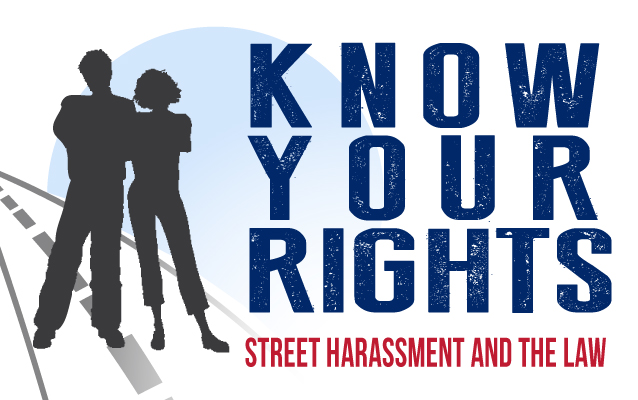 For many women, and some men, street harassment may be such a normal occurrence that they don’t even think of reporting it to police. Similarly, it’s not uncommon to be reluctant to report even serious incidents for fear that officers won’t take the report seriously, that they will engage in victim blaming, or that you will be subject to further harassment. (Unfortunately, this can be the case and we encourage you to file a complaint if this happens to you).
For many women, and some men, street harassment may be such a normal occurrence that they don’t even think of reporting it to police. Similarly, it’s not uncommon to be reluctant to report even serious incidents for fear that officers won’t take the report seriously, that they will engage in victim blaming, or that you will be subject to further harassment. (Unfortunately, this can be the case and we encourage you to file a complaint if this happens to you).
But Stop Street Harassment’s newest resource, Know Your Rights: Street Harassment and the Law, reveals that many common street harassment behaviors are in fact illegal across the U.S., giving you grounds to report an incident and seek help.
In preparation for the launch of our toolkit, I spoke to Officer Harris of the University of Washington Police Department about an incident of street harassment that he recently responded to.
The University of Washington Incident
The incident began as too many do: a female student was out for an evening run near the University of Washington campus when a man allegedly jumped out from around a corner, grabbed her by the arm, and said, “How are you doing tonight?”
As anyone who has experienced street harassment knows, a harasser’s language may be benign in itself but it usually comes with an intimidating interaction.
The student responded with a few choice words and crossed the street. (While SSH doesn’t recommend profanity or insults, an assertive response can help prevent sexual assault and/or feelings of disempowerment.)
After making sure the man hadn’t followed her – although he did leer in her direction – the young woman returned home and called University Police. Harris responded to the call, checked the area where the incident took place, and the young woman identified the man in question. He was arrested and charged with assault.
While it would be better if street harassment didn’t happen at all, the situation Harris described is ideal in terms of the young woman’s safety and the police response. I asked Officer Harris if he felt there was any room for discretion in determining whether or not to arrest the offender.
“No,” he said, “she was afraid for her safety and her well-being.” Given that it was after dark and “the guy grabbed her and really scared her,” he added, “I think most police officers would have taken that very seriously.”
Unfortunately, we know that not all officers see street harassment so clearly. But Officer Harris presented the perspective we hope all police officers will have and the standard that you should hold your community police to.
“Even if somebody made rude comments,” Harris said, “or made somebody feel unsafe, even if it wasn’t a crime yet, we would still go and talk to them.” Officer Harris stressed that no one should feel “unqualified” to call the police because what happened to her or him did not escalate to physical assault. It is appropriate, he told me, for an officer to have a “knock-it-off” conversation with someone even before an incident becomes criminal.
“A lot of very serious incidents start off as ‘it’s not that serious, it’s not a big deal.’ … But we’ll be glad to go investigate and keep things from escalating.”
In a society that says street harassment is a “compliment,” or “no big deal,” Harris’ perspective may sound too good to be true. But in fact, it may be a sign that advocacy efforts do work.
Notably, Victim’s Advocate Natalie Dolci provides the University of Washington officers with a variety of training and support to best address sexual assault, stalking, and gender-based violence.
I asked Harris what his main takeaways were from the training he has received and what advice he might have for other officers.
* He shared that he learned what a lasting impact sexual assault and sexual abuse can have on a person, and stressed that it’s important for officers to take every case very seriously.
* He included street harassment in that sentiment, noting that officers have a role to play in preventing street harassment from “becoming a habit” or escalating.
* He also added that his department works to have a positive relationship with the community and looks “for directions from the community on what problems they have or what they need help with.
Reach out to your department,” he said, “and let them know what you need.”
Have you reported street harassment to the police? What happened? What did officers in your community do well, or what would you like them to do differently? Leave your stories and ideas in the comments, and check out our new Know Your Rights toolkit to learn about the laws in your state.
Talia Hagerty has been a Stop Street Harassment intern since June 2013. She also is a peace economics consultant working on a variety of projects that ensure the equitable economic participation of all. She holds a B.A. in Economics from Eckerd College and an M.S. in Global Affairs with a concentration in Peacebuilding from New York University. Talia blogs about peacebuilding, human rights, economic development, and witty responses to street harassment. Follow her on Twitter: @taliahagerty.
